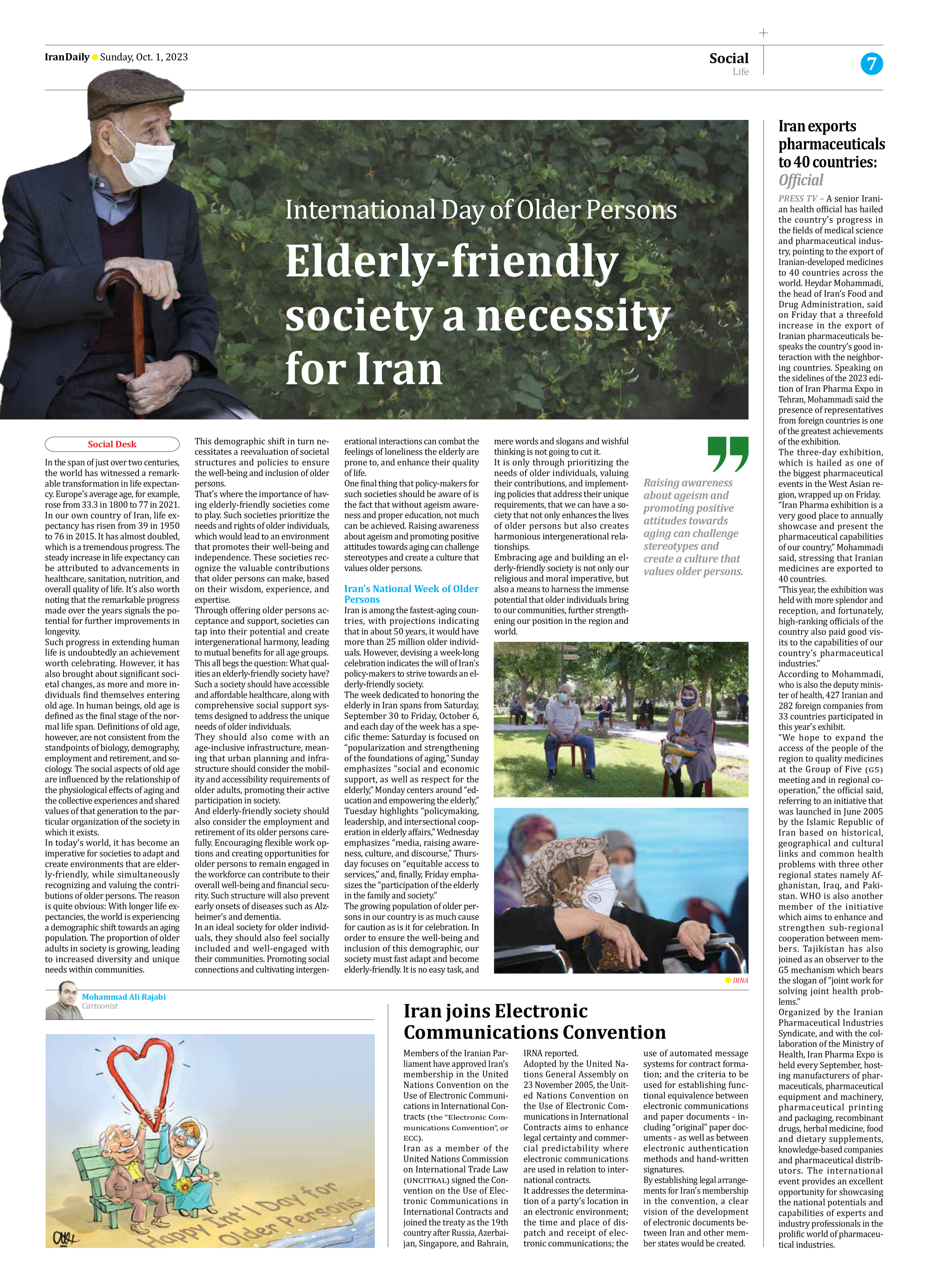
International Day of Older Persons
Elderly-friendly society a necessity for Iran
In the span of just over two centuries, the world has witnessed a remarkable transformation in life expectancy. Europe’s average age, for example, rose from 33.3 in 1800 to 77 in 2021.
In our own country of Iran, life expectancy has risen from 39 in 1950 to 76 in 2015. It has almost doubled, which is a tremendous progress. The steady increase in life expectancy can be attributed to advancements in healthcare, sanitation, nutrition, and overall quality of life. It’s also worth noting that the remarkable progress made over the years signals the potential for further improvements in longevity.
Such progress in extending human life is undoubtedly an achievement worth celebrating. However, it has also brought about significant societal changes, as more and more individuals find themselves entering old age. In human beings, old age is defined as the final stage of the normal life span. Definitions of old age, however, are not consistent from the standpoints of biology, demography, employment and retirement, and sociology. The social aspects of old age are influenced by the relationship of the physiological effects of aging and the collective experiences and shared values of that generation to the particular organization of the society in which it exists.
In today’s world, it has become an imperative for societies to adapt and create environments that are elderly-friendly, while simultaneously recognizing and valuing the contributions of older persons. The reason is quite obvious: With longer life expectancies, the world is experiencing a demographic shift towards an aging population. The proportion of older adults in society is growing, leading to increased diversity and unique needs within communities.
This demographic shift in turn necessitates a reevaluation of societal structures and policies to ensure the well-being and inclusion of older persons.
That’s where the importance of having elderly-friendly societies come to play. Such societies prioritize the needs and rights of older individuals, which would lead to an environment that promotes their well-being and independence. These societies recognize the valuable contributions that older persons can make, based on their wisdom, experience, and expertise.
Through offering older persons acceptance and support, societies can tap into their potential and create intergenerational harmony, leading to mutual benefits for all age groups.
This all begs the question: What qualities an elderly-friendly society have?
Such a society should have accessible and affordable healthcare, along with comprehensive social support systems designed to address the unique needs of older individuals.
They should also come with an age-inclusive infrastructure, meaning that urban planning and infrastructure should consider the mobility and accessibility requirements of older adults, promoting their active participation in society.
And elderly-friendly society should also consider the employment and retirement of its older persons carefully. Encouraging flexible work options and creating opportunities for older persons to remain engaged in the workforce can contribute to their overall well-being and financial security. Such structure will also prevent early onsets of diseases such as Alzheimer’s and dementia.
In an ideal society for older individuals, they should also feel socially included and well-engaged with their communities. Promoting social connections and cultivating intergenerational interactions can combat the feelings of loneliness the elderly are prone to, and enhance their quality of life.
One final thing that policy-makers for such societies should be aware of is the fact that without ageism awareness and proper education, not much can be achieved. Raising awareness about ageism and promoting positive attitudes towards aging can challenge stereotypes and create a culture that values older persons.
Iran’s National Week of Older Persons
Iran is among the fastest-aging countries, with projections indicating that in about 50 years, it would have more than 25 million older individuals. However, devising a week-long celebration indicates the will of Iran’s policy-makers to strive towards an elderly-friendly society.
The week dedicated to honoring the elderly in Iran spans from Saturday, September 30 to Friday, October 6, and each day of the week has a specific theme: Saturday is focused on “popularization and strengthening of the foundations of aging,” Sunday emphasizes “social and economic support, as well as respect for the elderly,” Monday centers around “education and empowering the elderly,” Tuesday highlights “policymaking, leadership, and intersectional cooperation in elderly affairs,” Wednesday emphasizes “media, raising awareness, culture, and discourse,” Thursday focuses on “equitable access to services,” and, finally, Friday emphasizes the “participation of the elderly in the family and society.”
The growing population of older persons in our country is as much cause for caution as is it for celebration. In order to ensure the well-being and inclusion of this demographic, our society must fast adapt and become elderly-friendly. It is no easy task, and mere words and slogans and wishful thinking is not going to cut it.
It is only through prioritizing the needs of older individuals, valuing their contributions, and implementing policies that address their unique requirements, that we can have a society that not only enhances the lives of older persons but also creates harmonious intergenerational relationships.
Embracing age and building an elderly-friendly society is not only our religious and moral imperative, but also a means to harness the immense potential that older individuals bring to our communities, further strengthening our position in the region and world.







